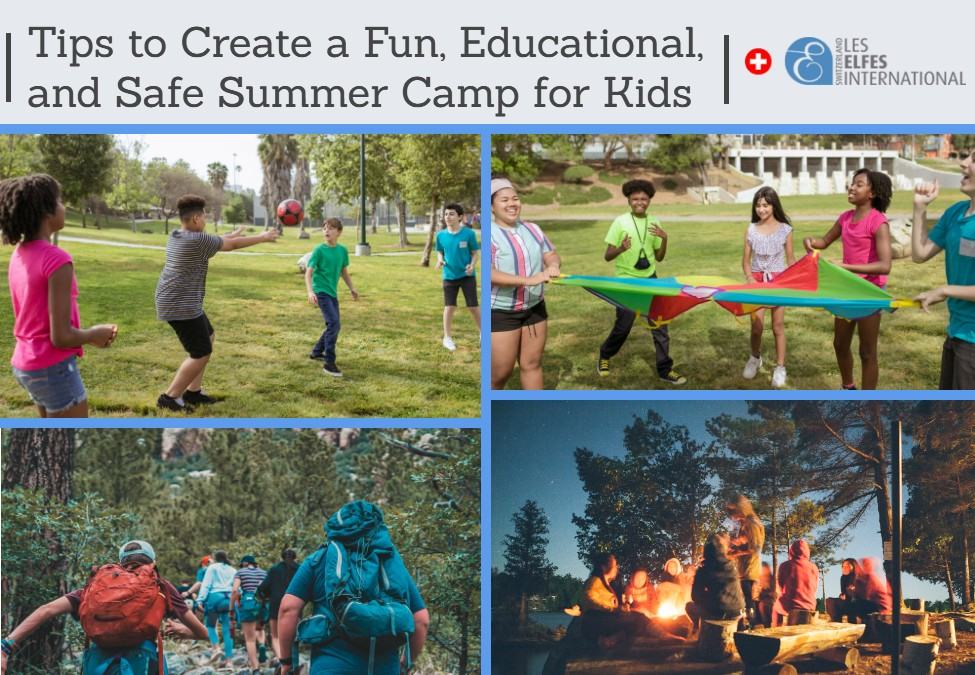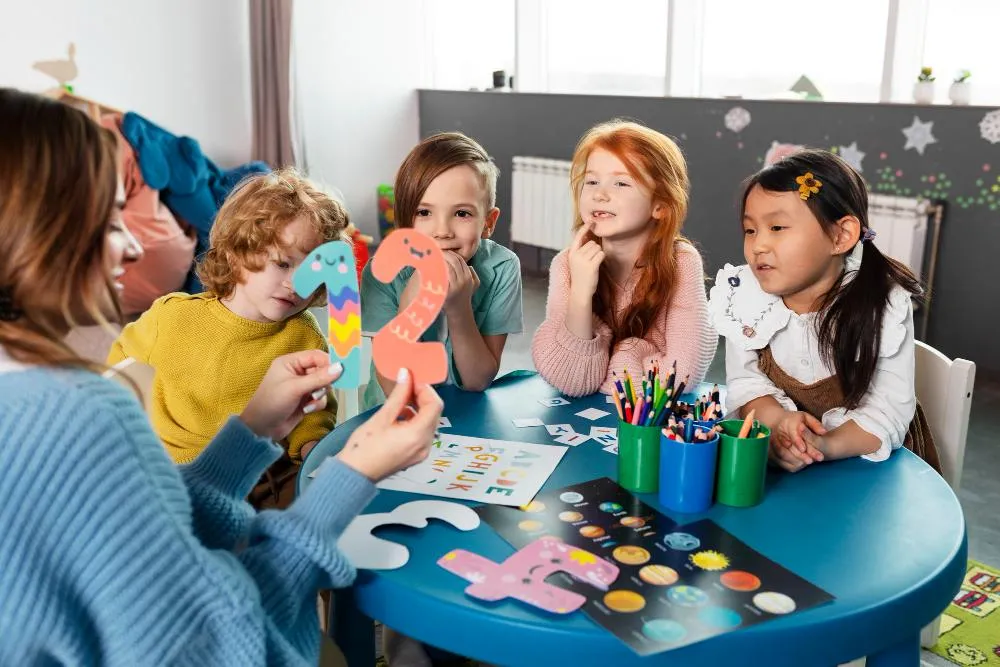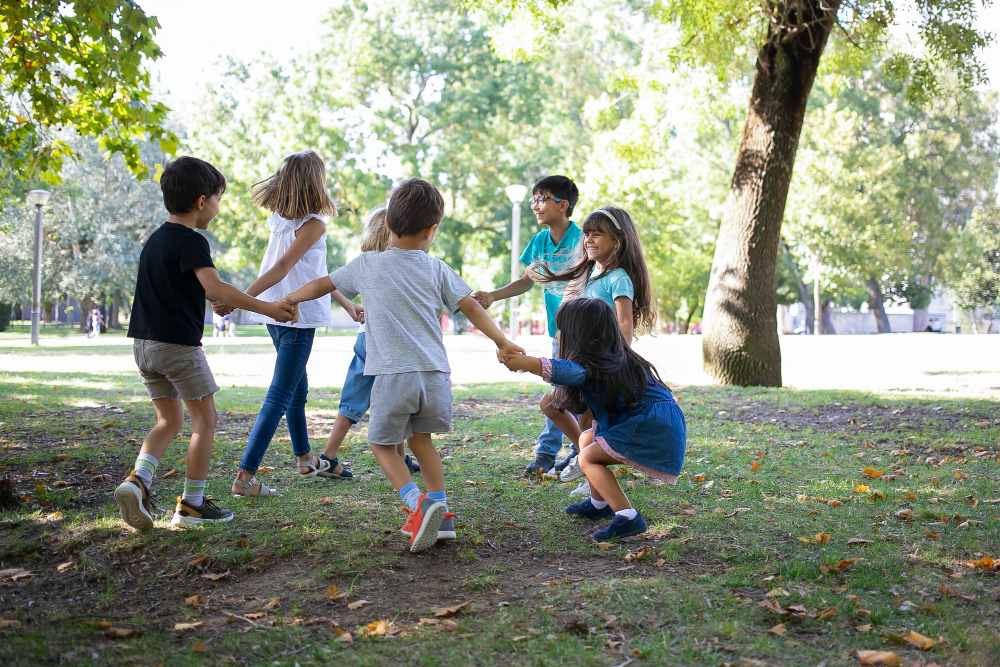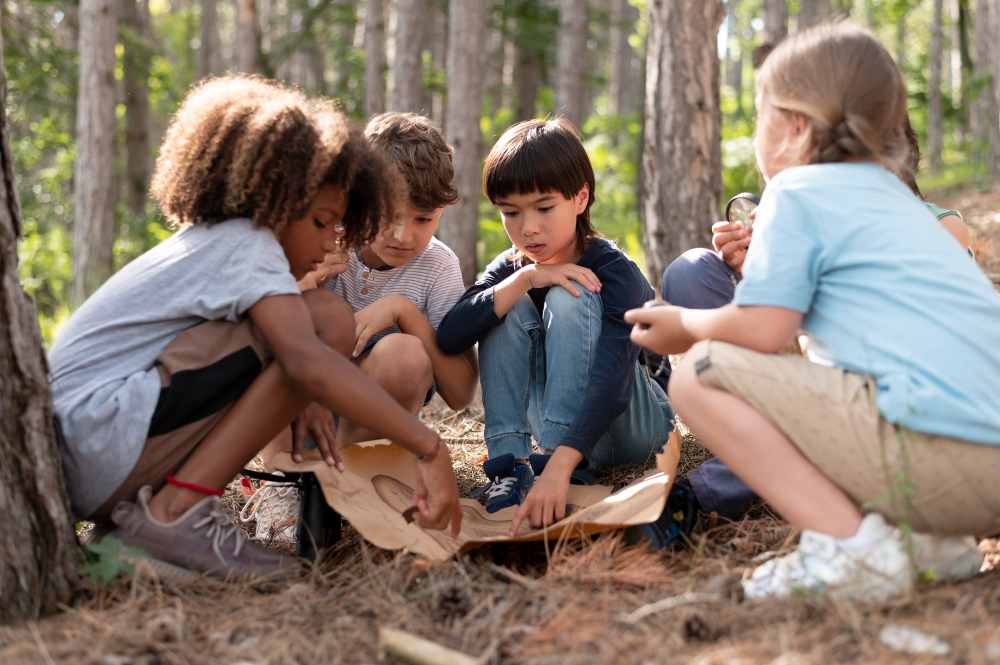Besides creating lasting memories, sending your child to a summer camp allows them to make new friends. Summer camps provide an ideal environment for kids to develop their self-esteem and learn new skills.
An excellent international summer camp teaches kids how to be resilient and teamwork while offering activities allowing children to connect with nature. The right summer camp environment should prioritize children’s safety by ensuring camp staff are well-trained, caring, and experienced enough to allow children to grow.
Preparing for a Successful Summer Camp
Lots of organization and planning goes into creating a successful summer camp. So, where do the camp proprietors start? Here are some tips.
Define Camp Objectives
As a camp proprietor, it’s important to understand the purpose and goals of your facility. What do you want campers to experience and learn during their time at the summer camp? Establish what you want them to accomplish once their time at the camp is over. Think about the activities your camp offers. Do they encourage children to be creative? What about promoting learning or nurturing kids to develop various skills? Planning the ideal summer camp experience can be taxing, but proprietors can collaborate with professionals to customize their camp’s curriculum and activities to align with their camp’s objectives.
Plan a Well-rounded Curriculum
A well-rounded summer camp curriculum ensures campers have an engaging yet diverse learning experience. An extensive curriculum should incorporate the following.
Educational Activities
Include academic subjects that are age-appropriate and align with the camper’s interests. These include history, language arts, science, and math. Adopt interactive teaching practices such as educational games, experiments, debates, and projects to make learning enjoyable.
Incorporate activities encouraging campers to develop and nurture their creativity and artistic skills like dance, drama, music, and visual arts. Ensure the curriculum allows campers to learn new techniques and exhibit their talents.
Physical Fitness and Sports
Provide various physical and sports activities. Plan individual and team sports, outdoor adventures like swimming or hiking, and relay races. Incorporate teamwork and sportsmanship lessons, and ensure they understand the importance of physical well-being.
Teach Life Skills
Incorporate practical skills that can benefit campers in their daily lives. Provide leadership, communication, problem-solving, money management, first aid, and cooking workshops. Besides empowering the campers, these skills boost their self-confidence.
Camp proprietors should strive to balance structured activities with unstructured time to help campers engage in things they are passionate about, bond, and relax. A well-rounded curriculum should meet your camp’s objectives while catering to different age groups.
Evaluate and modify the curriculum depending on feedback from clients and your observations. Doing so helps you develop an engaging, dynamic, and rewarding curriculum for campers.
Engage Qualified and Enthusiastic Staff
Engaging the right staff helps you provide a successful summer experience. Finding and retaining talented and passionate individuals can be challenging. Here are tips to ease the process.
Advertise Open Positions
Today, you can advertise vacant positions on social media, job boards, professional networks, educational institutions, and local community groups. Communicate your expectations and staff requirements, and define the application process clearly to attract suitable candidates.
Outline the responsibilities and roles for each open position in your summer camp. Highlight the experience, qualifications, and certifications needed for critical roles such as lifeguards, activity instructors, counselors, and healthcare providers.
Conduct a Rigorous Interview Process
Use a structured interview process when screening applicants. Ask pertinent questions to gauge their skills, qualifications, passion, and experience working with children. Establish their ability to navigate challenging situations, assist with the camp’s objectives, and work in a team.
Run Background Checks and Contact References
Background checks are critical to choosing the right staff and guaranteeing the safety of campers. Call their references to establish their suitability, reliability, and work ethic for the role. Contact potential candidates’ previous supervisors or employers to establish their performance.
Creating a Safe Environment
A safe environment is crucial when creating a summer camp. Here are tips to help you guarantee the safety and well-being of campers.
Ensure Appropriate Facilities
Conduct an in-depth risk assessment of the summer campsite, planned activities, and facilities. Determine any potential hazards like water bodies, uneven terrain, poorly placed equipment, or weather-related dangers and work out strategies to alleviate them and guarantee campers a safer environment.
Acquire medical data and emergency contact details for every camper. Communicate with their guardians or parents to determine any special needs, medical conditions, or allergies campers may have. Secure a well-stocked first-aid kit and ensure all the staff undergo thorough CPR and first-aid training.
Ensure the campsite is spacious enough to accommodate all the planned activities adequately. Remember to thoroughly inspect the camp to ensure it meets local safety standards. Make sure the fire extinguishers and fire alarms are functional. Evaluate the emergency exits and provide adequate lighting. Perform regular maintenance of the summer camp to identify potential issues promptly.
Establish Clear Rules and Guidelines
Set up comprehensive but clear safety procedures and policies for your camp, including behavior management, transportation, emergency response, and supervision guidelines. Ensure all staff members and campers understand and adhere to the policies. Tailoring your guidelines and rules to your camper’s age groups is also important. Remember, young campers will need concrete yet simple rules, while older counterparts will understand complex guidelines. Establish rules based on the developmental stage and abilities of your campers.
Enforce rules across the entire summer camp consistently to ensure every party is conversant with and follows the rules. Consistency establishes a sense of fairness and guarantees an orderly environment.
Communicate the consequences of breaching the rules. Ensure the staff and campers understand the disciplinary actions they’ll face for violating the guidelines. However, ensure the consequences are appropriate, consistent, and fair for the violation.
Remember, you can reinforce rules and guidelines by adhering to the rules yourself. Ensure staff members follow the rules consistently. Practicing positive role modeling promotes a culture of responsibility and respect. Review your rules regularly to determine their effectiveness.
Ask your staff members, campers, guardians, or parents for feedback. Doing so will help you identify areas that require improvement. Make the necessary adjustments to ensure the rules maintain their suitability.
Implement Effective Supervision
Enforcing adequate supervision helps guarantee the well-being and safety of campers at your facility. But how can you uphold a solid supervision system? Here are tips.
Maintain Appropriate Camper-to-staff Ratios
Establish a suitable staff-to-camper ratio depending on the camper’s needs, age, developmental stage, and activities they’ll be engaging in. Study the legal requirements and industry standards governing camper-to-staff ratios within your location. Remember, these may vary based on factors like the type of activities your camp offers, duration of stay, and unique circumstances of the summer camp.
Remember, some activities require more supervision than others, meaning more staff will be required. These include outdoor adventures, water sports, and field trips. Are the campers attending overnight or day camp? The camper-to-staff ratios, in this case, will vary accordingly. Campers attending overnight camp will require more supervision than their counterparts at a day camp.
Assign Qualified Staff to Oversee Different Activities
Choose your staff carefully to ensure the safety and adequate supervision of campers at the facility. To enhance the effectiveness of day camp activities, consider matching staff expertise and interests.
Evaluate their qualifications, certifications, and experience and establish their areas of competence and suitability for specific activities. For example, staff with a background in arts will be suitable to handle arts and crafts lessons. At the same time, individuals passionate about sports can oversee athletics, tennis, mini golf, or athletic activities.
Provide your staff with the necessary orientation and training to execute their duties effectively. Doing so ensures consistency while enabling them to give campers a positive experience. Be flexible and ready to adjust based on the international summer camp’s changing dynamics and needs. Leverage camp feedback to make the necessary changes to provide the best experience for campers.
Adopt collaborative planning by making your staff members part of the planning process. Encourage them to share their ideas to improve activity programming. Collaboration promotes a sense of investment and ownership among your staff members, helping them deliver more meaningful and engaging activities.
Open communication with staff supervising different activities facilitates effective execution. Ensure they understand their responsibilities and roles clearly. Discuss any changes or updates regarding the activities regularly to ensure everybody is on the same page. Encourage your staff to share suggestions, concerns, or feedback to enhance the camp experience.
Monitor Campers’ Well-Being, Ensuring They Are Safe and Accounted For at All Times
Monitoring camper’s well-being at the summer camp significantly guarantees their accountability and safety within the facility. You can do so by:
- Creating staff awareness:Teach staff members the art of always remaining vigilant and observing campers. Prioritize the importance of monitoring campers’ well-being, interactions, and behavior keenly. Your staff should beware of the camp surroundings and be alert to potential concerns and risks.
- Supervise the camper check-in and check-out process:Adopt an effective system for checking campers during scheduled events or meal times. Doing so ensures that all campers are accounted for and are in the right location at the appointed time.
- Maintain attendance and roster records for every event and activity: Doing so allows you to monitor the participation and presence of every camper. Analyze the attendance records regularly to identify any arising issues and ensure all campers are accounted for.
- Supervision during transitions:Be overly attentive to campers as they transition between activities and during breaks. Transition periods can be disorganized, especially during the first week of camp. Exercising caution ensures all campers stay together and are accounted for.
- Adopt the buddy system:This involves pairing campers and encouraging them to look out for one another. It encourages a sense of responsibility while increasing the likelihood of discerning when someone is missing without delay.
Infusing Fun and Educational Elements
Incorporating fun and educational features in your summer camp program creates an enriching and engaging experience for campers. Provide a wide range of activities to allow campers to choose the best that align with their interests. You can accomplish this by:
Offer Diverse Activities
Adopting theme-based activities: Classify campers according to their age groups or skill level, choose a theme for each group, and design activities around it. These can include attending a wilderness adventure, biking, attending field trips, or engaging in swimming competitions. Having a theme makes educational-based activities more fun.
Hands-on learning: Create opportunities for campers to practice hands-on learning. Incorporate science projects, interactive experiments, cooking workshops, arts and crafts, or nature exploration. Doing so allows campers to participate in various experiential activities and learn through them actively.
Outdoor adventures: Plan outdoor adventures like camping, hiking, field trips to farms, gardens, parks, and nature walks. Include environmental education, wildlife observation, and nature-based activities to help campers connect with and appreciate nature.
Creative arts:
Incorporate activities that encourage campers to be creative and self-expressive.
Provide drama, visual arts, dance, music, and creative writing sessions.
Encourage the campers to probe their artistic talents, develop new skills, and display their creations.
Team building and sports:
- Incorporate team building and sports activities in your program.
- Plan team sports, relay races, cooperative games, and obstacle courses.
- Reiterate the value of sportsmanship, teamwork, and healthy competition.
Stem exploration:
- Include STEM (Science, Technology, Engineering, and Math) activities to provoke campers’ problem-solving and curiosity skills.
- Provide coding workshops, science experiments, robotic challenges, and engineering projects.
- Make STEM activities accessible and engaging with age-appropriate challenges and hands-on projects.
Workshops and guest speakers: Invite experts, guest speakers, or professionals to run workshops and provide talks on topics related to the camp’s areas of interest. They can share their experiences, provide insights, and inspire the campers through their prowess.
Physical and sports activities: Include sports like volleyball, swimming, basketball, soccer, or tennis in your program. You can also provide non-traditional sports such as archery, yoga, or martial arts. Provide options for different interests and skill levels to accommodate a wide range of campers.
Performing arts: Provide activities in music, dance, improvisation, or theatre. Allow campers to learn new dance styles, perform skits, play musical instruments, and participate in a talent show.
Foster Experiential Learning
Experiential learning keeps campers engaged in hands-on and active experiences, enhancing their knowledge comprehension and retention. To foster experiential learning, you need to:
Engage campers’ senses: Develop activities involving multiple senses to boost the learning experience. Integrate sensory elements such as sound, sight, taste, smell, and touch to create more immersive and memorable activities.
Adopt real-world connections: Linking your lessons to real-world applications helps learners understand the relevance of their lessons. Bridge academic ideas to everyday experiences and practical programs to illustrate the application of knowledge in the real world.
Outdoor exploration and field trips: Accompany campers to nature reserves, historical sites, local businesses, museums, and field trips. These experiences provide the ideal opportunities for hands-on learning while allowing campers to explore the world away from camp.
Project-oriented learning: Allocate campers to projects that compel them to apply things they’ve learned in a practical context. These may involve problem-solving, research, collaboration, and creativity. Encourage campers to be liable for their projects and provide the necessary guidance.
Discussion and reflection: Reserve time for campers to ponder their experiences and participate in meaningful discussions. Encourage campers to share their connections, insights, and thoughts when participating in the summer camp activities.
Use simulations and role-playing: Doing so allows campers to recreate real-life scenarios. Campers can assume different roles, make informed decisions, and encounter the outcome of their actions within an educational and controlled environment.
Making mistakes is part of learning: The summer camp environment should be a safe space where campers can make and learn through mistakes comfortably. Encourage campers to evaluate their mistakes and reflect on the lessons. Doing so helps them develop problem-solving skills and resilience.
Integrate Team-Building and Social Interactions
Incorporating team-building activities and promoting social interactions helps create an inclusive and positive environment in summer camps in Switzerland 2023. To achieve this, you must include the following in your summer camp program:
Icebreaker activities: Whether campers attend camp for the first time or not, icebreaker activities help them interact with and get to know each other. These activities include team-building exercises, name games, and get-to-know-you activities.
Team challenges: Plan team challenges that campers can collaborate in to counter challenges and solve problems. These challenges can either be mental, physical, or both. Reiterate the importance of strategic thinking, effective communication, and teamwork to achieve success.
Group projects: Allocate group projects encouraging campers to work together towards a common goal. This may involve developing a structure, creating a performance, or planning a themed event. Group-based projects encourage creativity, collaboration, and collaborative decision-making.
Team-building initiatives and games: Include games and team-building initiatives focusing on communication, problem-solving, conflict resolution, and trust-building. These activities encourage campers to work together, develop robust relationships, and learn from one another.
Conflict resolution and communication workshops: Provide sessions or workshops on effective conflict resolution and communication. Ensure campers understand how to settle conflicts constructively, listen actively, and express themselves assertively. These skills help campers develop healthy relationships and maintain positive social interactions.
Communication and Inclusion
Proper communication and inclusion are crucial to creating a positive summer camp environment. Here are tips to help camp proprietors actualize this.
Maintain respectful and open communication:
- Provide an environment where campers will share their ideas and thoughts while expressing themselves comfortably.
- Encourage respectful communication and active listening among staff, campers, and volunteers.
- Exemplify positive communication practices and guide campers to ensure they understand the practical communication approach.
Encourage participation:
- Create opportunities for campers to participate and contribute actively.
- Make sure that discussions and activities facilitate equal engagement and participation from campers of different personalities, backgrounds, and abilities.
- Don’t allow exclusionary or favoritism practices.
Use respectful language:
- Train campers on using considerate, respectful, and inclusive language among themselves.
- Discourage stereotypes or assumptions about abilities, race, or gender.
- Promote an inclusivity culture by reiterating the value of diversity and celebrating individual differences.
Establish clear communication channels: Campers, their parents or guardians, and staff should be able to communicate via dedicated communication apps, online platforms, phones, or email.
Encourage feedback:
- Encourage parents, guardians, staff, and campers to provide feedback regarding the camp program, activities, and overall experience.
- Consider availing anonymous feedback options for individuals who prefer sharing their feedback anonymously.
- Leverage feedback to make the necessary improvements and address arising matters.
Communicate with guardians and parents regularly:
- Keep parents updated about camp schedules, activities, changes, or any updates.
- Communicate regularly through parent meetings, emails, and newsletters.
- Provide a platform for parents to share their concerns and ask questions.
Provide staff training: Train staff members to ensure they understand effective communication strategies, conflict resolution approaches, and active listening skills. Ensure staff members communicate accurately and timely, address concerns, and manage communication challenges.
Create an Inclusive Environment
An inclusive environment helps campers feel respected, welcomed, and valued in the summer camp. You can promote inclusivity by:
Embracing diversity: Acknowledge and celebrate the diversity among campers, such as differences in ethnicity, race, gender, socioeconomic background, ability, and religious or cultural beliefs.
Educate staff and campers: Train staff members and campers about inclusion, equity, and diversity. Organize workshops or create activities that promote appreciation, empathy, and understanding for varying experiences and backgrounds.
Create equal opportunities: Ensure all campers have equal opportunities to engage in decision-making processes, leadership roles, and activities. Allow campers to showcase their unique talents without favoritism.
Promote understanding and empathy: Encourage campers to listen and learn from each other’s experiences. Cultivate a culture of empathy, kindness, and acceptance.
Peer mentoring and support: Have campers support one another and provide mentorship programs, allowing more experienced or older campers to guide and help newer or younger campers.
Continuous assessment and improvement: Evaluate the inclusivity of the summer camp environment by running surveys, collecting feedback, or holding discussions with parents, staff, and campers. Leverage the feedback to make adjustments and improvements to ensure the camp meets the needs of all campers.
Conclusion
You need excellent planning skills and attention to detail to create a fun, educational, safe summer camp in 2023. A well-organized summer camp creates a structured, nurturing environment supporting children’s holistic well-being and development. It provides opportunities for social connections, learning, creating memorable experiences, and promoting personal growth.
The ideal summer camp facility nurtures children to discover their talents and acquire skills they can leverage to shape their future lives. Implementing the tips in this article will help create a memorable and enriching summer camp experience for children.
Image Credit:
- Image by Freepik
- Image by pch.vector on Freepik
- Image by Freepik












